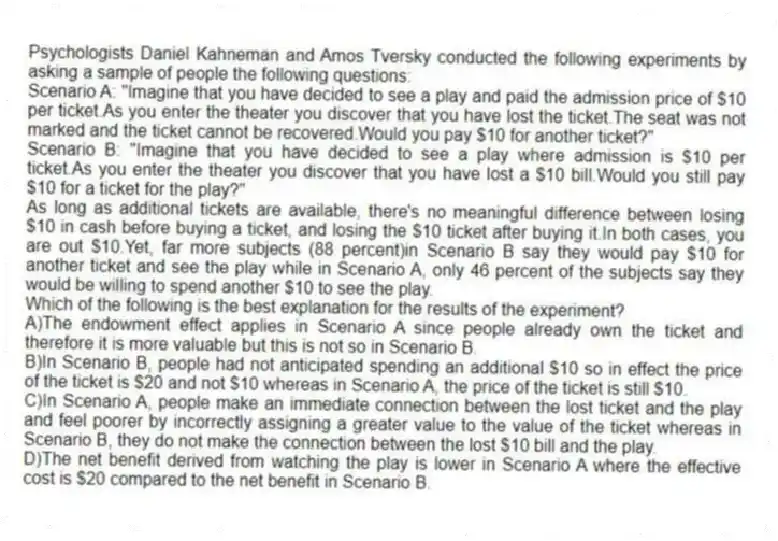
Psychologists Daniel Kahneman and Amos Tversky conducted the following experiments by asking a sample of people the following questions:
Scenario A: "Imagine that you have decided to see a play and paid the admission price of $10 per ticket.As you enter the theater you discover that you have lost the ticket.The seat was not marked and the ticket cannot be recovered.Would you pay $10 for another ticket?"
Scenario B: "Imagine that you have decided to see a play where admission is $10 per ticket.As you enter the theater you discover that you have lost a $10 bill.Would you still pay $10 for a ticket for the play?"
As long as additional tickets are available, there's no meaningful difference between losing $10 in cash before buying a ticket, and losing the $10 ticket after buying it.In both cases, you are out $10.Yet, far more subjects (88 percent) in Scenario B say they would pay $10 for another ticket and see the play while in Scenario A, only 46 percent of the subjects say they would be willing to spend another $10 to see the play.
Which of the following is the best explanation for the results of the experiment?
A) The endowment effect applies in Scenario A since people already own the ticket and therefore it is more valuable but this is not so in Scenario B.
B) In Scenario B, people had not anticipated spending an additional $10 so in effect the price of the ticket is $20 and not $10 whereas in Scenario A, the price of the ticket is still $10.
C) In Scenario A, people make an immediate connection between the lost ticket and the play and feel poorer by incorrectly assigning a greater value to the value of the ticket whereas in Scenario B, they do not make the connection between the lost $10 bill and the play.
D) The net benefit derived from watching the play is lower in Scenario A where the effective cost is $20 compared to the net benefit in Scenario B.
Correct Answer:
Verified
Q215: Sunk costs
A)are costs associated with repairing something
Q216: What is the endowment effect?
A)the phenomenon that
Q217: Studies on consumer behavior have found that
Q218: The endowment effect suggests that that people
A)have
Q219: Grace Makutsi finally bought a pair of
Q221: Suppose you pre-ordered a non-refundable movie ticket
Q222: A sunk cost is
A)another term that means
Q223: What is the endowment effect?
A)the tendency of
Q224: Under J.C.Penney's everyday low pricing policy, the
Q225: A common mistake made by consumers is
Unlock this Answer For Free Now!
View this answer and more for free by performing one of the following actions

Scan the QR code to install the App and get 2 free unlocks

Unlock quizzes for free by uploading documents